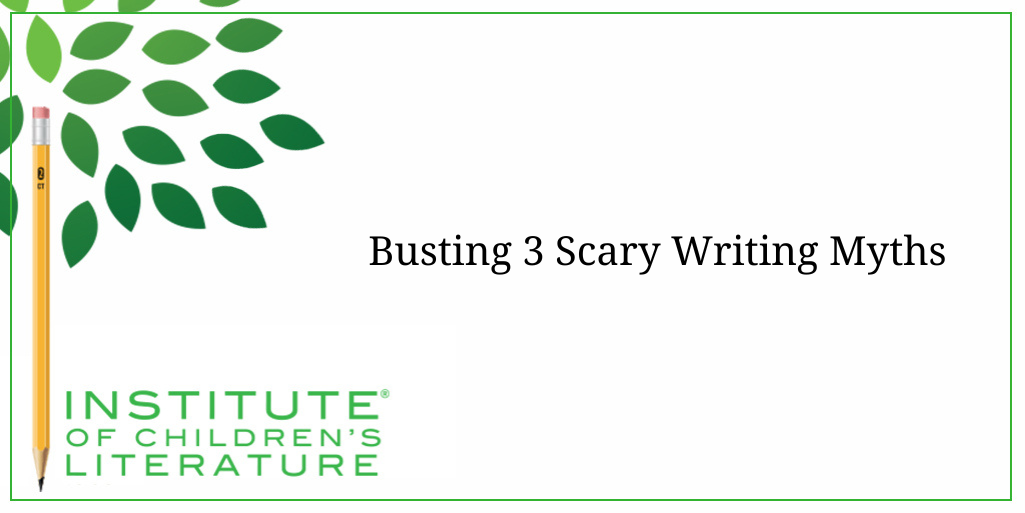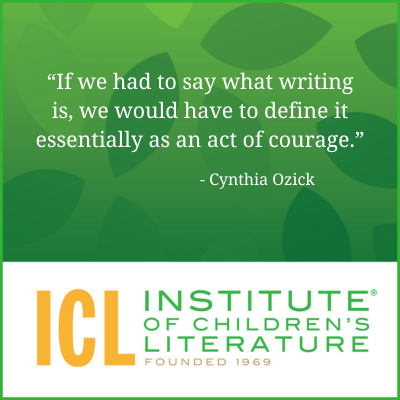
5 Ways Writers Can Prep for 2025 Goal Setting
Before we roll on to the new writing year, let’s harness our optimism for the blank slate before us and prepare for our 2025 Goal Setting just for writers.

Some of the more pernicious myths are those connected to writing. They hang on because writers are a nervous and paranoid lot. We recognize that no matter how much we study, practice, and grow, there is simply some extra, virtually magical element to writing that elevates it above mere craft. And that is terrifying. As a result, we tend to build up myths to insulate us from the possibility of “breaking” our writing, and myths to help us find that magic through some magical thinking of our own. Let’s look at some scary writing myths we can bust.

Sadly, I’ve seen this style argument used to keep writers from learning and growing. And one myth that will solidly do that to you is the myth that reading books, especially books targeting your genre or age group, will ruin your style. The thought behind this is that you’ll somehow lose your style in the process of encountering the style of so many other writers. In reality, style isn’t that fragile.
Let’s talk for a moment about style. Writing style is made up of all the ways you use language: word choice, sentence forms, figures of speech, etc. Writing style isn’t something you have to go searching for. Your writing style comes out of the things you’ve learned, the experiences you’ve had, and the things that are important to you.
Your writing style will change over time. That’s because it comes out of who you are as a person, and we are always changing and evolving. But we don’t normally become totally different people (unless you are an alien shapeshifter, in which case, cool!). Because our personal growth and change don’t stop us from being us. Similarly, you can’t stop your writing style from being your writing style. The only way to really influence your writing style strongly is to do it intentionally—which is hard.

This actually makes perfect sense. Casting off your style or even changing it intentionally is hard, because style is such a fundamental part of who you are. Your writing style is the way you write when you relax into it and concentrate on the subject or the plot instead of on the minutia of the mechanics of writing. It’s what happens when you let you be you. As a result, you’re not going to ruin it by taking writing classes, getting feedback, doing revisions, or reading a lot of books. Not unless one of those activities fundamentally changes who you are. You might go through some clunky periods if you grow overly self-conscious of your writing, but if you stick with it, those clunks will smooth out. And your style will emerge intact.
What you’ll get from activities like writing courses, feedback, and extensive reading is ease. The more you learn through classes, reading, revision, and feedback, the more you gain writing ease because you simply know more about writing. Writing will still be challenging, but it will be easier. You’ll feel more sure. You’ll grow. But your style will always be there as a thread running through your work because style comes from you.
I’m not going to tell you that no one ever steals from writers. There are too many fee-charging agents still out there who are making a living off writers. There are too many “cost-sharing” publishers who are doing the same. And whenever you fork over money and get next to nothing back, that feels a lot like stealing. But the thing writers tend to worry about the most is someone stealing their work and claiming it as their own. That fear tends to be over-inflated.

In the real world, professors who read your unpublished work aren’t going to steal it. Editors who get your submission aren’t going to scratch your name off and publish it without you. Agents aren’t going to write the name of someone they already represent on your manuscript and sell it. Does it never, ever, ever, ever in the history of time happen? I can’t say that. But it happens so rarely that it’s a little like winning the lottery or being carried away by a tornado. Possible, yes. But you’re probably worrying about the wrong thing. There are a lot more likely things that are standing in the way of your success.
You may say you know a guy who knows a writer who suffered exactly that. Well, maybe. Or maybe the publisher already had a book in the pipeline that was very similar, and they published it. Possibly without anyone ever having gotten around to reading your submission.
Here’s a creepy thing about writing: most of us are working in similar cultures and consuming similar media, and thus we’re putting similar fuel into our creative caldrons. As a result, the ideas that bubble to the surface won’t all be the same—but some will be startlingly close to the same. Several times, I’ve had an idea that felt new and novel, only to see a book come out with a very similar premise. And the publisher wasn’t psychically copying my idea. The other writer and I simply had similar ideas pop up because of the cultural and artistic diet we fed our brains.
Having said that, if you put your work online—published or unpublished—the chances of parts of it being copied and passed off as someone else’s increases by a lot. It’s why most “stealing” happens when a writer copies from a published work, not from something done by their critique partner. And sometimes this copying is accidental. You might put a particularly clever metaphor in your novel, only to realize years later that it came from something you read in To Kill a Mockingbird when you were in high school.
But some copying is intentional. Keep in mind, that works put online also stand the chance of being copied by AI, which is a sadly more likely problem. AI is technically not writing anything ever. If you ask an AI to write something (and people are doing exactly that), the AI is cobbling together something based on what it has “read”—and that could include anything you’ve put online. And (as we’ve learned) it could also include published works that are available electronically.
If you want to be as safe as possible, limit the people who read your work before it’s published. And don’t post unpublished work in public spaces. Keep an eye on developments in AI, because it’s best to know the real potential problems brewing.
There’s a famous writing quote that describes writing: “You simply sit down at the typewriter, open your veins, and bleed.” No one knows exactly who first coined the phrase about writing and bleeding. It probably wasn’t Hemingway, to whom it is often attributed. But the idea that writing, or good writing, only happens when the writer is suffering is a popular one. It’s part of the whole suffering artist mythology.

So, if you want your audience to cry over a scene, it will almost certainly require you to type it with tears in your eyes. But is that the same as saying good writing requires misery? Or that all writing comes from wounding yourself? Not really.
Writing can be hard. It’s a challenge to take people and situations that live in your head and translate them into dark squiggles on a page. And sometimes it’s a challenge we shy away from.
We procrastinate because writing can be uncomfortable and scary, but is that the same as misery? Many things we’ve experienced were uncomfortable and scary and became the best parts of our lives. I can tell you that my one and only experience with childbirth was profoundly uncomfortable and scary, but still wonderful. And, honestly, none of my books were anywhere near as uncomfortable to produce as the wriggling baby that kept me awake for the first month of her existence.
And writing isn’t just challenging. It can be fun and exciting. I’ve laughed out loud as lines popped into my head that a particularly saucy character might say. I’ve held my breath as I wrote about my characters running through the dark woods only to trip and roll down a hill. I’ve fallen a little bit in love as characters flirted.
All the things you feel when you read a good book, you can feel when you write one. And just as a good book can sometimes take you to an uncomfortable, scary place when you read it, it can do that when you write it. But it can also help you explore and work through hard things, just as reading a good book can sometimes help.
Despite the challenges that writing puts before you, don’t be afraid of learning, reading, and improving. Don’t be afraid of submitting to publishers and agents that you’ve researched carefully. Don’t be afraid of getting a critique partner. There may be a few things that go bump in your writing night but be brave and you’ll make it through just fine.
With over 100 books in publication, Jan Fields writes both chapter books for children and mystery novels for adults. She’s also known for a variety of experiences teaching writing, from one session SCBWI events to lengthier Highlights Foundation workshops to these blog posts for the Institute of Children’s Literature. As a former ICL instructor, Jan enjoys equipping writers for success in whatever way she can.

Before we roll on to the new writing year, let’s harness our optimism for the blank slate before us and prepare for our 2025 Goal Setting just for writers.

Writers can be thin-skinned when it comes to getting feedback on their work. Let’s look at 4 ways to positively deal with constructive criticism!

Rejection is part of the territory when it comes to being a writer. Today we offer reflection for writers to help redirect your efforts after a rejection.
1000 N. West Street #1200, Wilmington, DE 19801
© 2024 Direct Learning Systems, Inc. All rights reserved.
1000 N. West Street #1200, Wilmington, DE 19801
© 2024 Direct Learning Systems, Inc. All rights reserved.
1000 N. West Street #1200, Wilmington, DE 19801
© 2024 Direct Learning Systems, Inc. All rights reserved.
1000 N. West Street #1200, Wilmington, DE 19801
© 2025 Direct Learning Systems, Inc. All rights reserved.
1000 N. West Street #1200, Wilmington, DE 19801
©2025 Direct Learning Systems, Inc. All rights reserved. Privacy Policy.
3 Comments
I truly do enjoy your articles, Jan Field. They always resonate. Bravo!